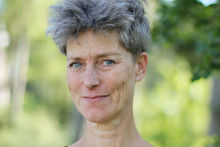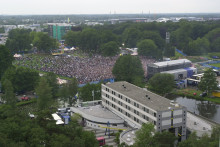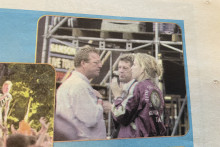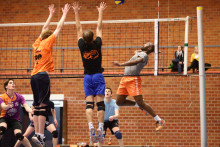Fireworks disaster
What impact did the fireworks disaster – exactly 25 years ago today – have on the University of Twente? U-Today looks back with three stories to 13 May 2000, when a fireworks factory exploded in the Roombeek neighbourhood of Enschede. This is the story of Els Rommes, a PhD student at the UT, whose flat was badly damaged. ce content hre...
Twice before, Rommes, who both studied and obtained her PhD at UT, told her story to the university press. Shortly after the disaster, she returned to her badly hit flat in the disaster area with a UT-Nieuws reporter. Ten years later, when she had just given birth to her daughter, she spoke in her house on the dike in Ooij about the impact of the disaster on her life. And now, again, she is willing to tell what role the fireworks disaster has played in her life over the past 25 years. Rommes is currently an Associate Professor of Gender & Diversity at Radboud University in Nijmegen.
'Actually, it's New Year's Eve that usually reminds me of it,' says Rommes (55). 'I am still fervently opposed to fireworks.' And then sometimes there are small triggers that make it come back again. Not that it bothers her, fortunately those days are over. It does, however, feel to her that 'there’s a time before and a time after the disaster’. 'Other people may have that with corona. I have that with this disaster.'
Concentration problems
Rommes was working in another town in Twente on the day in question. A friend called, told her about the explosions, and it soon turned out that her flat was in the disaster area. Rommes couldn't get in, for days she wandered along the fences, and tried to get to her guinea pigs. They were eventually rescued. The UT arranged a temporary home for her, but concentration problems plagued the PhD candidate, and she sought help from a support group and the student psychologist. Three months after the disaster, she could finally return to her flat. Two years later – Rommes had just completed her PhD – her UT office went up in flames due to the fire in the TW/RC building, the current Cubicus.
When asked how she remembers that period, Rommes takes a long time to think. 'I think bittersweet best describes it in terms of feeling. Melancholic too. It has become a memory with a sort of emotional layer. But it also feels like I learned a lot from it. I had come to a standstill in a certain way in 2000 – I had far too many side jobs – and did not move forward in my life. The disaster became a kind of turning point. I had to rethink and start over. After that, I managed to complete my PhD quite quickly, because I had a better understanding of what was really important, and dared to make choices.'
Shared experience
Rommes says that she can look back at many things from that period with a smile. A lot of jokes were made, she remembers. 'Do you know what the highest point in Enschede is? The sidewalk, they said back then. But I also remember that I once got very angry when I heard anti-Twente supporters on the train making taunts about blowing up Enschede. She also remembers a sense of a 'shared experience’. 'I was walking in a supermarket just after the disaster, and saw that other people had their cheeks wet with tears. Just like myself. You understand each other’s reasons for crying and then you just start talking to each other. That was a special feeling of shared experiences.'
For years, during her lectures at Radboud University, she cited the fireworks disaster as a case study. Rommes told students about coping mechanisms and how she herself used to solve things in her head. 'But if you can no longer enter your house because of a fireworks disaster, that can’t be solved rationally. Then you will need other coping methods, such as giving your emotions space or distracting yourself. For the first ten years that I told them about that disaster, the students hung on my every word and it was very quiet in the lecture hall. The current generation had not even been born yet, so that disaster doesn't mean anything to them. I don't use that example anymore.'
Roombeek
It says a lot about the passage of time and how things change. Last year she and her wife visited the Roombeek district for the first time: 'How beautiful it has become there, really beautiful.' She no longer recognised any landmarks, but her flat on the Dokter van Damstraat is still there. 'Of course it has been refurbished considerably.' Her flat was right next to the Grolsch factory, on the border of the inner and outer ring of the disaster epicentre of that time. As for the new TV series about the Fireworks Disaster, she will definitely watch it. As she says it, she notices that it moves her. 'I haven't had that for a long time... I expect I will recognise a lot of the neighbourhood and the city where I lived and studied for so long. Enschede will always have a special place in my heart.'






